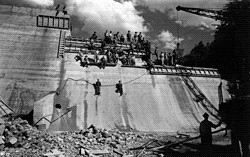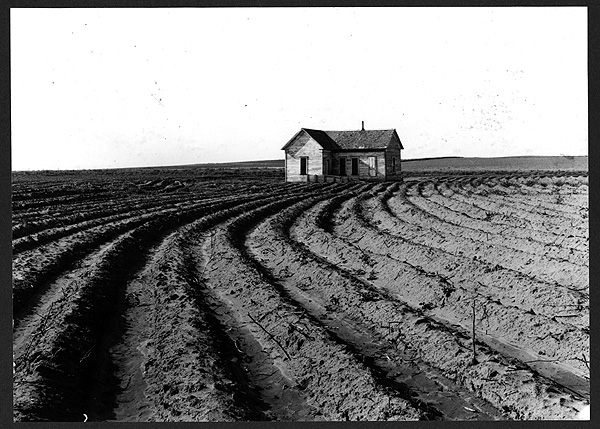Today, how would you go about using the political
system to address an environmental issue?
So what you need to watch for in this chapter is the change in strategy and tactics and who was involved
Big federal government projects (not in wartime) are a new thing in the 1930s.
The key history leading into this was the New Deal: big projects run by federal government during the Great Depression
Big Ridge Dam, TVA
power farming displaces tenants, Texas 1938
As in the film "The River", dams were built with the idea that humans could control nature
The next step was political efforts to protect wilderness--this showed the power of passing new laws
- talk to or write to congressional representative--goes back to late 19th century
- local example
- Can Clemson sell off some of the experimental forest for development?
- pressure local
decision makers such as President Barker
- in the case of the experimental forest the federal government gave the land to Clemson for research
- but congress has already made similar exceptions
- next step would be a letter writing campaign to try an exception being granted
- lawsuit that
exception was illegal or didn't follow government
rules
- town meetings--laws in 1970s requiring consulting the public--and even if not required it may be useful to find out and try to influence public opinion
- collect signatures
to force a referendum on the issue so the public will
vote on it--became more common in 1980s
- try to get news
coverage and get the public excited about the
issue--goes back to late 19th century
- lawsuits, often
arguing the existing regulations haven't been
followed--resulted from new environmental regulations
around 1970
- protests
- get attention and
news coverage--grew strong in the Progressive era
- actually stop
something from happening, sometimes by breaking the
law--copied in the 1970s from the civil rights and
anti-Vietnam war movements
So what you need to watch for in this chapter is the change in strategy and tactics and who was involved
Big federal government projects (not in wartime) are a new thing in the 1930s.
The key history leading into this was the New Deal: big projects run by federal government during the Great Depression
- dams had become more important as a source of electricity, particularly after the development of alternating current systems invented by Tesla
- The Great Depression
and the New Deal
- Civilian Conservation Corps starting in 1933 put men to work on rural projects, particularly reforestation
- Tennessee Valley
Authority --bring development to rural
areas. Why did the federal government get
involved?
- control flooding on Tennessee river
- promote development by providing inexpensive electricity both to residents and for industry
- teach more modern methods of farming, homebuilding, etc.

Big Ridge Dam, TVA
- The Story of Hoover
Dam and Hoover Dam Construction

Hoover Dam- the 1930s and then
WW2 led people to increasingly believe we don't have to
worry about the limits of nature because we can overcome
them with technology
- Rural Electrification Authority established in 1935 to organize locally owned co-ops to provide electric service in areas where the farms were too far apart to make it profitable for private companies to set up systems. In 1935 only 10% of farms had power from a network (some generated their own electricity).
- Part of the idea was to improve rural life so people would stay on farms instead of moving to cities to look for work
- they sometimes argued that people had a right to electricity
- the government
was promoting the spread of technology
- Farm Chemurgic Council established to find new uses for farm products (eg. making alcohol to be used as a substitute for gasoline).
- George Washington Carver developed
325 products from peanuts.

power farming displaces tenants, Texas 1938
As in the film "The River", dams were built with the idea that humans could control nature
- The Bureau of
Reclamation--federal agency whose job was to make
land productive for agriculture--dams and
particularly water systems
- had selected 81 dam sites by the early 1950s
- that momentum for dam building is successfully challenged in the fight against Echo Park
- Conservationists/environmentalists successfully mobilized the public against Echo Park Dam
- note that success was based on public opinion
- get the public to write letters to their congressional representatives
- what exactly can
you stop? funding
- in the Echo Park case there was a bill in Congress to provide money for 10 dams
- Bureau of Reclamation offers a compromise: to take out Echo Park Dam
- the compromise
was accepted by the environmental activists
- 1880-1960--government protects some land in national parks and forests
- the primary way to fight projects harmful to the environment was to persuade Congress to not fund them
- 1960-1980--government regulation: new laws that limited harm to the environment, many of which applied to both private industry and government
- after 1980 fewer
new laws, more fights in Congress and the courts
about how to interpret the laws
The next step was political efforts to protect wilderness--this showed the power of passing new laws
- Nash covered
this story as well, but pay attention in Rothman
particularly to what is politically effective and
how political tactics change
- Wilderness Act of 1964
- this led to a whole series of new laws in late 1960s and early 1970s
- Clean Water Act,
Clean Air Act, Endangered Species Act, NEPA
- environment and presidential politics (interview)
- passing new laws
- protests
- public opinion
- someone in Congress writes a law
- it gets debated and revised
- has to pass both Senate and House of Representatives
- the President has to sign it
- a government agency often carries it out or interprets it
- it get thrashed
out in the courts
